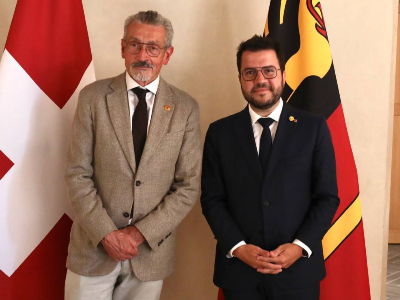- The Head of the Executive said in Geneva this afternoon that "now the ball is in the Spanish state's court"
- Pere Aragonès met with the WHO and the President of the Cantonal Parliament
The President of the Generalitat, Pere Aragonès, said this afternoon from Geneva that the opinion made public today by the UN human rights committee "is clearly a moral and political victory in the face of a repression carried out by the Spanish state, which especially affected political leaders chosen by the citizens". The president added that this decision "reinforces us and gives us more arguments to move towards amnesty and to accompany the claim of the defending a referendum to decide the political future of Catalonia. It gives us many more arguments".

"Now the ball is in the court of the institutions of the Spanish state, so that they change their policies and end once and for all the repression", remarked the president, who stressed that "the United Nations have been clear: the rights of deputies, political rights of the citizens of Catalonia have been violated."
The Head of the Executive made these statements in Geneva, where this morning he met with mental heath officials in the WHO, with whom he dealt with the rights of people with mental health problems and the National Pact for Mental Health. He explained that "we have agreed to intensify collaboration with the WHO and we will have their support and accompaniment in this great agreement to backup the fight for the mental health and emotional well-being of the population as a whole".
The President then visited the Cantonal Parliament (Grand Conseil), where he met with its president, Jean-Luc Forni. Pere Aragonès explained that in this meeting "we have been able to share the main political lines, of the fight against climate change, improving the well-being of citizens and also cross-border issues" and thanked the president of the Grand Conseil "for his hospitality and willingness to continue collaborating in the future".

The Head of Government also visited this afternoon the photographic exhibition "Arrels. Les Catalanes i Suïssa, 1950 – 2022" (Roots. The Catalans and Switzerland, 1950 -2022), which reviews the history of the migration of Catalan women in Switzerland from the mid-twentieth century to the present day. Organized by the Government Delegation in Switzerland, with the support of the Geneva City Council, the exhibition can be visited throughout the month of August at the Quai Gustave-Ador.